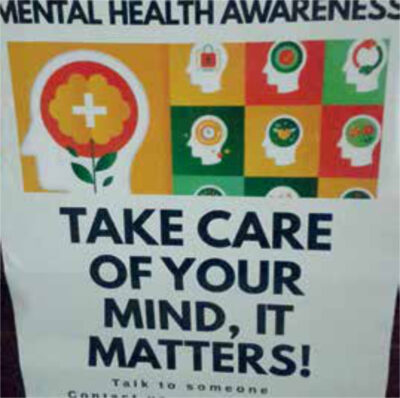Main content
Usually you see a Consult Online case report in MTb. This time we had wanted to present a case report that relates to the theme of this edition, but unfortunately we did not have any at present. We take this opportunity to request you to submit mental health questions to our enthusiastic Consult Online panel as well. For now we present you a case from Ghana, written by Mohammed Salim Sulley Wangabi, a clinical psychologist, who presents his insights in the mental health care sector in West Africa.
Setting
This case was seen in a modern regional hospital in Accra, the capital of Ghana, with 620 bed capacity and a variety of specialties including a modest but expanding clinical psychology department.
Background
In Ghana, the estimated prevalence of mental disorders is 13% of the adult population.[1] These disorders present in a variety of forms and require various forms of care which could be either pharmacological or non-pharmacological. The mental health sector in Ghana depends to a large extent on pharmacological methods of managing mental illness due to widespread shortages of qualified personnel and resources for psychosocial therapies and rehabilitation. There is also the issue of stigmatisation and superstition which is being grappled with. Mental disorders are prevalent but various factors, including financial capacity and lack of insight, have prevented the urgent management of depression and anxiety, amongst others, until they become severe, requiring pharmacological interventions. The Greater Accra Regional Hospital (Ridge) offers many health care services that promote the health and general well-being of Ghanaians. Notable among these services are the mental health services. The Clinical Psychology Centre is a professional and client-oriented department of the hospital that offers services such as assessments, evaluation and diagnosing of patients with psychological disorders, provision of appropriate therapeutic interventions, reviewing them after psychological intervention, or referring patients whose conditions call for further management and specialised care to other specialist professionals. In addition, the Clinical Psychology Centre provides education on psychological and mental health topics such as stress, anxiety and depression.

Case background
A 44-year old female business owner came to the emergency ward with a sudden onset of breathlessness. She had a medical history of hypertension, for which amlodipine was started one month previously. Now the patient complains about breathlessness at rest during the day, which worsens at night. She presented with feelings of numbness, cold at the extremities and hot flashes. Additionally, she reported some physiological discomforts such as headaches and uneasiness as well as inability to sit or lie down comfortably. The patient expressed worries that she might be experiencing symptoms of stroke, which made her scared as a stroke situation could render her incapable of taking care of her children. After initial assessment and monitoring, she was referred to the clinical psychologist for further management as all test results were negative. A mental state examination (MSE) indicated a patient who appeared dull and lethargic, well orientated to place, in person and time. In addition, the patient had poor insight into her hypertensive diagnosis. Her thought process was consistent and logical, but her thought content was fear of incapacitation from a stroke, which started over a month ago when she was put on anti-hypertensive medication. The patient was initially accommodating but seemed sad. She started losing interest in the course of the session, as she seemed in pain or discomfort, and was unwilling to say what was wrong or how she was feeling at that moment. She reported sleeplessness, poor appetite, and palpitations that commenced three weeks previously. The patient is a mother of two and living with her children at a rented apartment. She reported spiritual reasons that were stifling her business as well as causing her medical conditions. She has a secondary education, and sessions were done in English with periodic switches to Ga, her local dialect.
Assessment and diagnosis
After initial consultation, a provisional diagnosis of anxiety was made. The patient was taken through some basic relaxation techniques to provide some form of relief. Furthermore, she was assessed using the Hospital Anxiety and Depression Scale (HADS). Her scores were high on anxiety and low on depression, indicating a significant anxious thought pattern, feeling and behaviour. The patient was diagnosed with anxiety disorder and psychotherapeutic interventions were started.
Treatment
The patient was taken through the following therapies: progressive muscle relaxation to reduce uneasiness and facilitate sleep; cognitive restructuring to replace maladaptive thought patterns precipitating her anxious feelings; insight therapy to provide understanding of her conditions and the associated symptoms, and coping techniques to manage her behavioural changes due to her current diagnosis. A week after the initial intervention the patient returned to explore its effectiveness. She seemed to be more relaxed and less worried about her situation. Finally, she went through six sessions of cognitive behaviour therapy and reported an improvement in her thought patterns and emotions, and was feeling hopeful to proceed with her life activities. A post-therapy HADS assessment indicated an insignificant level of anxiety and depression as reported by the patient.
Conclusion
The Clinical Psychology Centre still faces teething problems but, as in this case, can provide significant psychological help for a wide range of people with diverse mental health challenges. The centre also provides training and supervision for both local and international students to prepare them in caring for people with mental health disorders. All these activities aim to ensure a mentally healthy society with insight and self-awareness. As this case demonstrates, awareness and attention to mental health problems, resulting in a proper diagnosis and adequate treatment, can significantly improve the health of members of society.
References
- Oppong S, Kretchy IA, Imbeah EP, et al. Managing mental illness in Ghana: the state of commonly prescribed psychotropic Medicines. Int J Ment Health Syst. 2016 Apr 5;10:28. DOI: 10.1186/513033-016-0061-9

















































